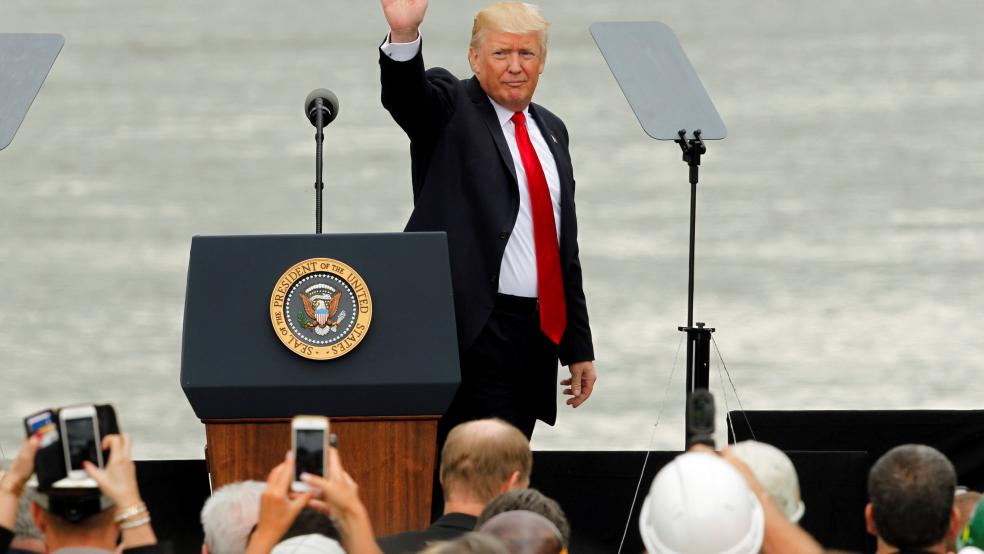WASHINGTON (Reuters) - The International Monetary Fund on Monday lifted its forecast for U.S. economic growth in 2017 and 2018 based on President-elect Donald Trump's tax cut and spending plans, but said this would largely be offset by weaker growth in several key emerging markets.
Updating its World Economic Outlook, the IMF kept its overall global growth forecasts unchanged from October at 3.4 percent for 2017 and 3.6 percent for 2018, up from 3.1 percent growth in 2016, the weakest year since the 2008-2009 financial crisis. The United States will see a slight 0.1 percentage-point improvement in 2017 gross domestic product and a stronger 0.4 percentage-point gain in 2018 as Trump lays plans for expansionary fiscal measures including tax cuts and infrastructure spending.These would push U.S. growth to 2.3 percent in 2017 and to 2.5 percent in 2018, the IMF said, noting that they could also stoke inflation in an economy already nearing full employment."If a fiscally-driven demand increase collides with more rigid capacity constraints, a steeper path for interest rates will be necessary to contain inflation, the dollar will appreciate sharply, real growth will be lower, budget pressure will increase, and the U.S. current account deficit will widen," IMF chief economist Maurice Obstfeld said in a statement.He added that such a scenario could raise the specter of more protectionist measures and retaliatory responses.But the new IMF outlook does not include any assumptions regarding Trump's proposed trade policies such as potential tariffs on Mexican and Chinese goods or a renegotiation of the U.S.-Canada-Mexico North American Free Trade Agreement (NAFTA).The IMF does assume a stronger dollar, a firming in oil prices and "more inflationary pressure and a less-gradual normalization of U.S. monetary policy."While stronger oil and commodity prices have improved the picture for oil exporters including Nigeria, the steeper U.S. yield curve and tighter financial conditions will negatively affect some big emerging market economies, including Mexico.The IMF has cut Mexico's growth forecasts by 0.6 percentage points in both 2017 and 2018, also citing investment uncertainty related to U.S. policy. The IMF revised its 2017 growth forecast for China to 6.5 percent, up 0.3 percentage point from the October forecast, based on expectations for continued stimulative government policies, but left unchanged its 2018 forecast for a slowdown to 6.0 percent growth. [L4N1F62HW]The Fund said China's reliance on stimulus, rapid expansion of debt and slow progress in dealing with corporate debt "raises the risk of a sharper slowdown or disruptive adjustment."India, which has recorded some of the world's strongest recent growth is experiencing a shock to consumption from the government's decision to withdraw larger currency notes from circulation, chopping a full percentage point off the IMF's fiscal 2016-17 growth outlook to 6.6 percent.The Fund trimmed its fiscal 2017-18 forecast for India to 7.2 percent from 7.6 percent.The IMF raised its 2017 forecasts for the euro area and Japan by 0.1 percentage point each, largely because of a stronger-than-expected performances in the second half of 2016. Britain's forecast was increased 0.4 percentage point, but its 2018 growth was reduced by 0.3 percentage points.The IMF said the risks were tilted to the downside, with potential sources including protectionist policies, tighter financial conditions, banking system stress in Europe and increased geopolitical tensions.But it noted that there was potential for an upside growth surprises if the policy stimulus in the United States or China turned out to be larger than currently projected. It said it expects more certainty over the direction of U.S. policy by the time of the next full World Economic Outlook in April. (Reporting by David Lawder; Editing by Kim Coghill)IMF sees Trump spending aiding U.S. growth, some emerging markets weaker

STEPHANIE KEITH



